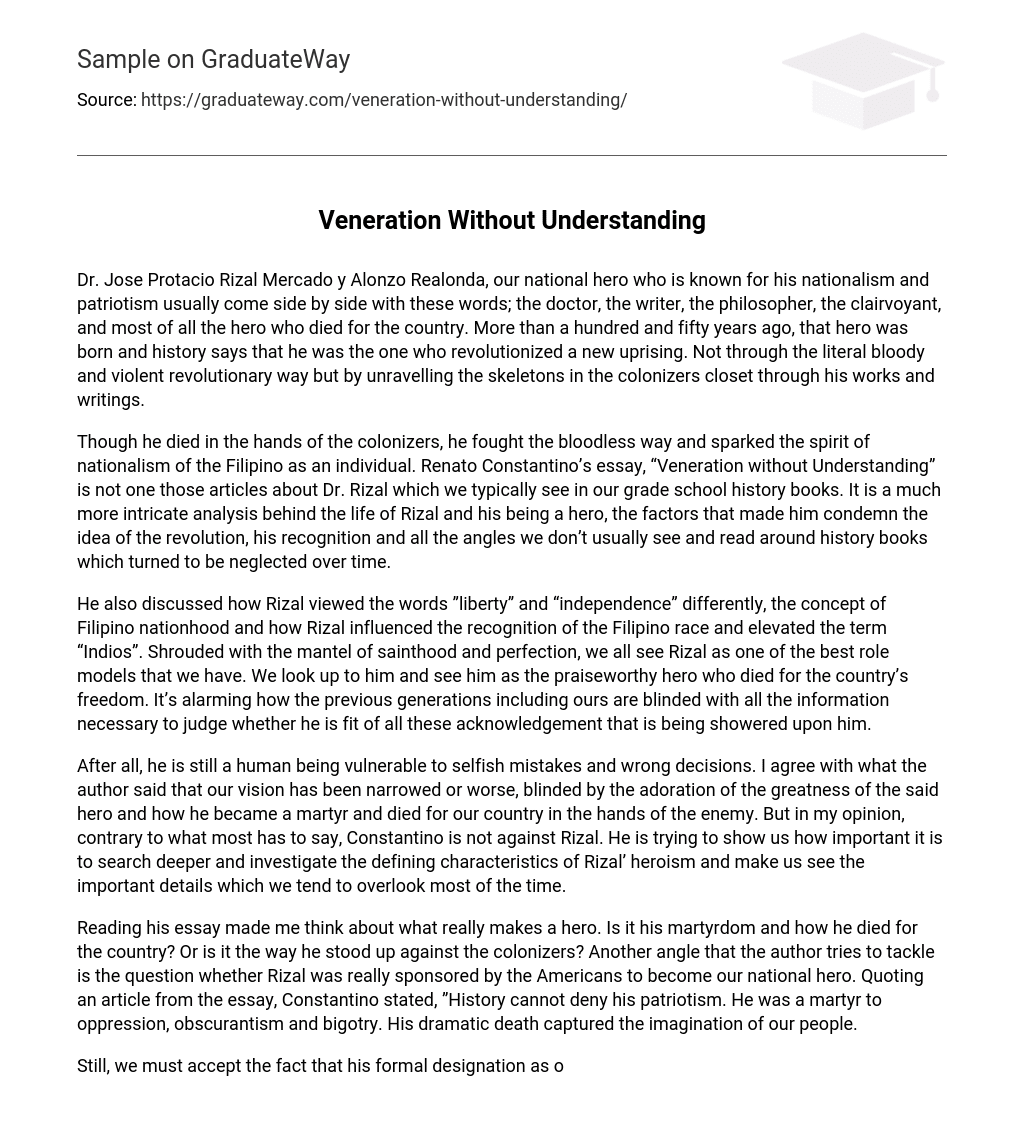Dr. Jose Protacio Rizal Mercado y Alonzo Realonda, our national hero who is known for his nationalism and patriotism usually come side by side with these words; the doctor, the writer, the philosopher, the clairvoyant, and most of all the hero who died for the country. More than a hundred and fifty years ago, that hero was born and history says that he was the one who revolutionized a new uprising. Not through the literal bloody and violent revolutionary way but by unravelling the skeletons in the colonizers closet through his works and writings.
Though he died in the hands of the colonizers, he fought the bloodless way and sparked the spirit of nationalism of the Filipino as an individual. Renato Constantino’s essay, “Veneration without Understanding” is not one those articles about Dr. Rizal which we typically see in our grade school history books. It is a much more intricate analysis behind the life of Rizal and his being a hero, the factors that made him condemn the idea of the revolution, his recognition and all the angles we don’t usually see and read around history books which turned to be neglected over time.
He also discussed how Rizal viewed the words ”liberty” and “independence” differently, the concept of Filipino nationhood and how Rizal influenced the recognition of the Filipino race and elevated the term “Indios”. Shrouded with the mantel of sainthood and perfection, we all see Rizal as one of the best role models that we have. We look up to him and see him as the praiseworthy hero who died for the country’s freedom. It’s alarming how the previous generations including ours are blinded with all the information necessary to judge whether he is fit of all these acknowledgement that is being showered upon him.
After all, he is still a human being vulnerable to selfish mistakes and wrong decisions. I agree with what the author said that our vision has been narrowed or worse, blinded by the adoration of the greatness of the said hero and how he became a martyr and died for our country in the hands of the enemy. But in my opinion, contrary to what most has to say, Constantino is not against Rizal. He is trying to show us how important it is to search deeper and investigate the defining characteristics of Rizal’ heroism and make us see the important details which we tend to overlook most of the time.
Reading his essay made me think about what really makes a hero. Is it his martyrdom and how he died for the country? Or is it the way he stood up against the colonizers? Another angle that the author tries to tackle is the question whether Rizal was really sponsored by the Americans to become our national hero. Quoting an article from the essay, Constantino stated, ”History cannot deny his patriotism. He was a martyr to oppression, obscurantism and bigotry. His dramatic death captured the imagination of our people.
Still, we must accept the fact that his formal designation as our national hero, his elevation to his present eminence so far above all our other heroes was abetted and encouraged by the Americans. ” It seems plausible that Rizal was really favored by the Americans and gave him the status but this does not change the fact that he was the most important movement in Philippines’ journey towards freedom. We can never deny that he was the one who sparked the revolution and gave the Filipinos a sense of unity and identity.
Also, as the part of today’s youth, I can say that he is a great role model even though he condemned the idea of the revolution. I still give him the credit on innovating revolution. Seeing Rizal as a model does not mean that we should follow every step he has made in the past. This simply means that there are many paths in arriving towards the goal we seek just like Rizal who found a bloodless way in informing our brothers and sisters about the hell they been forced to live in. Now, society has come to an era where oppression is not as evident as it used to be.
This calls for an evolution of heroism within us. In order for this evolution to take place, we should rediscover the heroes from then and now and see them as human who stood up in the moment of desolation and gave their people the hope that they need. We should examine not only their strengths but also their weaknesses in order to learn their way correctly. Just like how the author Renato Constantino approached his study with our great and famous national hero, Dr. Jose P. Rizal.





